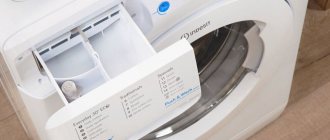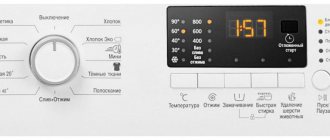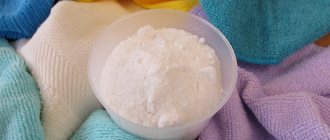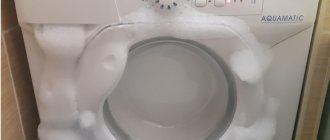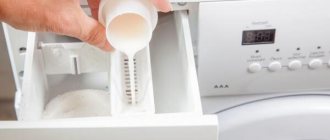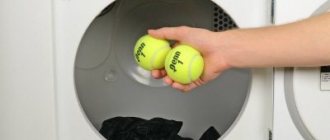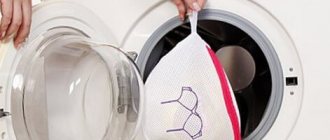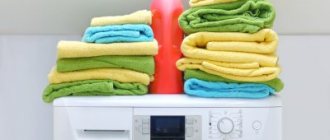Solid sediment on the internal elements of equipment often causes breakdowns of household equipment. An anti-scale solution for washing machines will help solve the problem - the product quickly removes deposits from the heating element and other parts.
Some food ingredients have a similar effect. To achieve maximum effect without harming the unit, you should choose a high-quality product and strictly follow the instructions.
We will tell you which cleaner you should give preference to - the article provides a rating of the most effective chemicals that have proven their effectiveness in practice. And adherents of traditional methods will be able to choose for themselves a proven recipe from improvised means.
In addition, we will talk about the feasibility and procedure for mechanical cleaning of the heating element, and also outline preventive measures that should be followed when operating the washing machine in order to prevent the formation of scale on the working units of the unit.
What product cleans the washing machine?
Citric acid is a descaler for washing machines and is used if you need to clean the parts inside the washing machine: heating element, drum, tank. Vinegar solution - used for internal cleaning of the automatic machine.
Interesting materials:
How to record a conversation on Skype? How to burn a bootable USB flash drive? How to burn a boot image to a flash drive? How to sign up for a charter flight to Uzbekistan? How to fill out a green card? How to fill out field 110 in a payment order? How to fill out the incoming correspondence log? How to fill out the Usn declaration when closing an individual entrepreneur 2022? How to fill out an electronic sick leave for an employer? How to fill out a green card 2022?
Causes and first signs of scale appearance
The formation of sediment is a real scourge not only of washing machines, but also of all household devices whose operation is based on heating running water. Hard deposits appear on parts responsible for heating and evaporating the liquid. As a rule, a heating element - a tubular electric heater - copes with this task.
The likelihood and speed of clogging of the heating element depends on the quality of the incoming water, the washing temperature and the frequency of use of the unit. If the machine regularly operates at 60° and above, then salt deposits accumulate more intensely.
The first signs of excessive scale formation:
- increased noise of the washing machine during the water heating stage;
- clothes become harder to wash, light-colored linen takes on a grayish tint;
- the machine does not heat up well - the door glass remains cold throughout the entire washing cycle;
- the appearance of an unpleasant odor on washed items and inside the drum;
- to achieve a good result you have to increase the amount of powder.
To finally verify the assumptions, it is advisable to inspect the heating element itself. The heating element is located under the washing machine tank or is slightly offset from the center to one side.
The appearance of a crust is promoted by magnesium and calcium salts - when the temperature rises, the elements are converted into solid sediment and carbon dioxide. Mixing with impurities and particles of rust, the deposits harden, covering the metal heating element and other parts of the washer with a film
If the presence of deposits has been diagnosed, then it’s time to begin descaling measures. Timely cleaning will help restore the heating element to normal efficiency and avoid a more serious problem - expensive equipment repairs.
Armed with a flashlight, you should shine it on the drum holes. In this case, the tank must be turned or rocked a little in order to better examine the heating element.
Mechanical cleaning of heating elements
Understanding the structure of an automatic machine and possessing primitive technical skills for servicing equipment, you can clean the heating element manually. However, it is better to entrust the assembly of the washing machine to a specialist - due to mistakes made, the device may pass current.
The mechanical method is effective - you can clearly see the condition of the heating element before and after treatment.
Disassembling the equipment is not recommended if the warranty period has not expired. After an independent “invasion” the unit is not subject to free service.
General procedure:
- Remove the rear wall of the unit.
- Carefully remove the heating element.
- Using anti-scale agent, clean the heating element; an alternative method is to soak the part in lemon juice or vinegar.
- Remove scale, clean, dry and install heating element. Reassemble the machine in reverse order.
During disassembly, you should also inspect the condition of the moving parts of the drum. Eating them is a more difficult task, which is not recommended to be done on your own.
The heating element must be cleaned very carefully. In this case, the use of sharp tools such as a knife, file or hard metal brush is unacceptable.
If the actions taken did not give the expected effect, then most likely the heating element requires replacement. You can learn more about choosing and installing a heating element from this article.
How to replace Antiscale? Traditional methods
The action of most purchased products is based on breaking down the structure of salt deposits with various acids, which means that improvised acid-containing substances are also suitable for cleaning heating elements. The role of anti-scale at home is performed well by citric acid and vinegar.
Option #1 - citric acid
If the washing machine is used intensively, the heating element should be cleaned once every 4 months. If the unit is turned on rarely, then the frequency of plaque removal is once every six months.
The amount of citric acid is determined by the maximum load of things in the machine. For example, for a 5 kg unit you will need 100 g of lemon
Cleaning sequence with citric acid:
- Unload all laundry from the machine.
- Measure out the required amount of cleaning product.
- Pour 1/5 of the citric acid into the drum, the rest into the powder cuvette.
- Select the longest and highest temperature wash cycle and turn on the machine.
- At the end of the work, run the washing machine in the rinsing mode. If possible, select the high water level option.
Finally, wipe the drum with a soft cloth and clean the drain filter. You need to make sure that no scale particles remain in the rubber seal.
Video instructions will help you properly clean the washer with citric acid:
Option #2 - vinegar
The remedy is very effective, but has not gained due popularity for two reasons. Firstly, acetic acid has a pungent odor - the aroma remains in the machine for some time after processing. Secondly, vinegar is more aggressive than citric acid, so it should be used with caution so as not to damage the seal.
Work progress:
- Empty the drum of things and pour 200 g of vinegar into it. Add 1/3 cup of acid solution to the powder compartment.
- Set the program to 90°C with a long wash cycle. Click "Start".
- After 5-10 minutes of work, pause in mode for 1 hour.
- After the time has expired, resume the program.
After cleaning, you need to run a rinse cycle to remove any remaining vinegar and dirt.
Due to the aggressiveness of vinegar, it is not recommended to resort to this method of dealing with scale more than once a year.
Some craftsmen claim that a machine can be cleaned with Coca-Cola. To remove deposits you will need 5 liters of drink. The technology is similar to using vinegar.
How to make antinaikpin with your own hands
It will probably not be a secret to you that the most common means that can be found in everyday life or in any store can fight scale. So, here is a rating of products that can be used instead of store-bought chemicals:
- lemon acid;
- Coca-Cola;
- vinegar essence (diluted).
Do you want to clean your machine cheaply and effectively? Using a “lemon”, pour it directly into the drum (a pack of up to 100 g is enough), and run the wash idle at 40 degrees.
If you want to use Coca-Cola, you will need about 3 liters of the sweet drink. Do you feel bad about pouring a drink into the machine? Ask the store if they have an expired batch - this is also suitable for SMA.
Using vinegar essence, measure out 50 g of liquid, diluting it with half a glass of water. Pour the liquid into the drum, start the 40-degree mode.
Make an anti-scale agent yourself or buy a ready-made product in the store and use it about 2 times a year to protect the machine from breakdowns.
Scrubman (Russia)
Another well-known domestic drug based on acids with the addition of a complexing agent. According to the manufacturer, the product fights scale at the ionic level and has a disinfecting effect on the internal parts of the unit. In addition to cleansing the heating element from solid deposits, aninakipin Scrubman No. 1 removes unpleasant odors from the drum, destroys fungus and mold.
The consumption of the product depends on the degree of water hardness. If the indicator is not precisely established, then you need to use the dosage as for the average level. An alternative is to focus on the “carrying capacity” of the machine. A bag of dry powder (250 g) is designed for a washing machine up to 6 kg.
Liquid bio-cleaner Scrubman No. 4 consists of an organic reagent; all components of the emulsion are biodegradable and harmless to the environment. The descaling agent has a milder effect compared to Scrubman No. 1 and is recommended for monthly use.
Main components included
Housewives are very careful about their household appliances. She helps with routine housework every day. Therefore, they look at chemicals like antiscale with distrust.
In fact, the main ingredients of anti-scale are three substances: adipic and sulfamic acids, as well as sodium citrate.
- Adipic acid has the property of excellent salt dissolution. Although it is very strong, it is harmless in small quantities and is used in the food industry. In the anti-scale formula its content is approximately 5%.
- Sulfamic acid is intended to clean metal equipment and machinery from rust, water scale and scale. The share of this component in the anti-scale agent is 30%.
- Sodium citrate is essentially a salt of citric acid, which occupies the vast majority of the composition of the product and makes up more than a third of the total mass.
As can be seen from the composition, the base in the formula is citric acid, enhanced by other ingredients. The proportions are maintained in such a way that the use of the drug is harmless to household appliances. Using components separately can have unpredictable effects on machine parts.
Antiscale is considered a universal means for removing scale from a washing machine, despite its chemical composition. But provided that the correct dosages and application characteristics are used. Only in this case can you count on an impeccable result while maintaining the integrity of the equipment parts.
Automatic washing machines perform a full washing cycle, from pre-soaking to the final spin. The process of washing clothes takes place in warm or even hot water, which is heated using a built-in heating element. Due to washing at high temperatures, scale often forms here.
. Anti-scale for washing machines and instructions for its use will allow you to quickly deal with the resulting scale and completely remove it from the drum.
Every automatic washing machine has a heating element. It is responsible for heating the water to the temperature specified in the program. And the higher the heating temperature, the higher the likelihood of scale formation. But the most important reason for its appearance is water, or rather, the magnesium and calcium salts it contains.
Causes of scale
The properties of hard water are known to everyone who has ever held a kettle in their hands, the inner walls of which were literally covered with layers of scale. During the heating process, the salts present in the water decompose, harmless carbon dioxide and scale itself, consisting of insoluble salts, are formed. Preventing its occurrence is very simple - you need to soften the water and completely remove calcium and magnesium salts from it. For these purposes, special filters are installed at the entrance to a house or apartment. But if there are no filters, then scale will not take long to appear.
The same thing happens in automatic washing machines, in which heating elements are installed to heat water. If you wash at a temperature of +40 degrees, then the amount will be minimal. But the higher the temperature, the stronger the decomposition reaction of magnesium and calcium salts will occur. Descalers for washing machines allow you to quickly get rid of this unpleasant phenomenon, which increases the duration of water heating and energy costs.
Water softeners
Antiscale should not be confused with the popular Calgon product. The latter is not a full-fledged descaling agent - it is rather a water softener. But it is not able to cope with the deposits already present on the heating element. Therefore, Calgon is only a means of preventing scale formation.
Antiscale and its properties
Cleaning the washing machine from scale should be done using Anti-scale agent. This product allows you to quickly get rid of deposits on the metal parts of the washing machine and on the heating element. The effect is noticeable already after the first treatment - the heating element becomes clean and shiny, its properties are restored, and the washing machine becomes more economical, since water is heated faster
.
Antiscale is not a means of preventing scale formation. Therefore, it does not need to be added to the powder when washing clothes. It is an independent drug, used separately from things. We will tell you about the method of application later.
Many users and experts constantly argue whether anti-scale is harmful for washing machines. Of course, any chemical preparations for descaling can be called harmful, because some of them can even corrode metals. Here you need to understand the fact that you need to use anti-scale once a quarter, but not more often
, since such drugs consist of aggressive components. Also, you should not exceed a dangerous dosage - manufacturers calculate everything, so there will be no harm.
If you use such products uncontrollably, according to the principle “you can’t spoil the porridge with oil,” then all plastic and rubber parts will suffer. Do you constantly wash at +40 degrees? Then you don’t have to think about scale – most likely, it won’t be there.
The method of using the anti-scale agent can be found on the back of the purchased product. There are a lot of similar products, the dosages are different:
- Bottle for 10 liters of water;
- A packet of powder for 2-3 washes;
- Tablet forms for one wash, etc.
For dosage information, please read the package leaflet. For example, Selena, an anti-scale agent for washing machines, is sold in packs of 100 grams. Dosing this product is very easy - 1 pack per cleaning (pour directly into the drum, turn on any washing program at a temperature of +40 degrees, and without pre-soaking).
But there is one general rule - the use of anti-scale should be done when the tank is empty
. To remove scale, place a certain amount of one or another product in a tray or drum, and run the recommended program. After finishing the wash, we will get a perfectly clean heating element - you can see it through the drum using a powerful flashlight.
Never exceed the dosage indicated on the packages, as this may damage the rubber seals and some plastic parts. Also, you should not exceed the maximum permissible frequency of using such products.
The invention relates to household chemicals, in particular to chemicals for removing from the internal metal walls of household appliances, including washing machines, dishwashers, steam generators and other scale - deposits formed when heating and boiling water due to precipitation contained in its salts (CaCO 3, MgCO 3, CaSO 4). Antiscale contains, wt. %: sulfamic acid 85-90; ammonium chloride 8-10, thiourea 0.5-1; nitrilotrimethylphosphonic acid 1-4.5. The technical effect is the creation of an inexpensive, environmentally friendly, gentle composition to prevent the formation of scale on the walls of household appliances.
The invention relates to household chemicals, in particular to chemicals for removing household appliances from the internal metal walls of containers, incl. washing machines, dishwashers, steam generators, scale - deposits formed when water is heated and boiled due to the precipitation of the salts contained in it (CaCO 3, MgCO 3, CaSO 4).
It is known that scale is easily dissolved by acids. So, for example, according to invention (1), scale is removed by treating it with a solution of a mixture of mineral acids - nitric and phosphoric, but in this case significant corrosion of the metal occurs. Nitric acid is taken concentrated, which is associated with a certain degree of danger; dissolution occurs slowly, and the scale does not completely dissolve.
Therefore, to remove scale in everyday life, as a rule, products based on weaker organic acids (adipic, citric, sulfamic, ethylenediamine tetraacetic, etc.) are used.
The Chemical Encyclopedia (2) shows the composition of the antiscale agent, which we adopted as a prototype. The composition contains: sulfamic acid (90%), ammonium chloride (9%), thiourea (1%).
However, this product prevents subsequent scale formation to a relatively insufficient extent.
The technical result of the invention is the use, on the one hand, of a simple, inexpensive, non-hazardous and gentle composition that has proven itself in everyday life, such as the described anti-scale agent, and on the other hand, which makes it possible to significantly prevent the formation of scale on the metal walls of household appliances.
The specified technical result is achieved by the fact that the antiscale containing sulfamic acid, ammonium chloride, thiourea, additionally contains nitrilotrimethylphosphonic acid (NTP) in the following ratio of components, wt.%: Sulfamic acid - 85-90 Ammonium chloride - 8-10 Thiourea - 0. 5 -1 Nitrilotrimethylphosphonic acid - 1-4.5 Nitrilotrimethylphosphonic acid (NTP) introduced into the composition acts as a corrosion inhibitor and surfactant, i.e. the NTP additive inhibits the formation of scale and, in addition, reduces water hardness.
The claimed set of essential features, namely the qualitative and quantitative composition of the anti-scale agent, makes it possible to obtain an inexpensive product that can effectively remove scale and inhibit the formation of scale.
All of the above allows us to conclude that the proposed anti-scale agent meets the criteria of “novelty” and inventive step.
To obtain the claimed composition, use sulfamic acid NH 2 SO 2 OH according to TU 113-08-560-85, ammonium chloride NH 4 Cl according to GOST 2210-73, thiourea (NH 2) 2 CS according to GOST 6344-73, nitrilotrimethylphosphonic acid (NTP ) 3 N 12 NO 9 R 3 PER TU 6-09-5200-00.
All components are publicly available and produced by domestic industry. NTF, for example, produces Cheboksary and Volgograd PA "Khimprom" not only to supply non-agricultural industries, but also supplies agriculture and livestock with this product, because NTF is widely used in the production of mineral fertilizers.
The composition is obtained as follows.
The apparatus is loaded in wt.% with sulfamic acid 85-90, ammonium chloride 8-10, thiourea 0.5-1, nitrilotrimethylphosphonic acid 1-45. Mix thoroughly. The resulting composition (composition) is fed to packaging machines.
Example of a specific application.
A package of anti-scale agent (2-2.5 kg) is poured into the empty drum of the washing machine. Start the machine into main operating mode without laundry. They let you work out the full program. During operation, the scale dissolves.
Sulfamic acid (pH 1.5-2) causes metal corrosion. Nitrilotrimethylphosphonic acid introduced into a solution of sulfamic acid acts as a corrosion inhibitor. Sulfamic acid in combination with ammonium chloride and thiurea intensively destroys deposits as a result of the active reaction of these components with scale: hydrogen and carbon dioxide are very actively released. Nitrilotrimethylphosphonic acid, adsorbed at the interface of 2 phases (solution and scale), forms a layer of increased concentration on it (adsorption layer), which leads to a sharp decrease in (interfacial) tension at the interface of these two phases, i.e. As a result of adsorption, surface tension decreases, as a result of which NTP reduces the work of formation of new surfaces, i.e. facilitates the dispersion of the relationship and at the same time, being deposited on the inner surface of the product, significantly prevents the formation of scale.
The proposed composition, due to the relatively small number of components, their availability, and practically environmental friendliness, will, in our opinion, find wide application in the household.
Sources of information 1. Auth. St. 317219, cl. From 23 F 1/28, 12/11/69
2. Chemical encyclopedia. - M.: Soviet Encyclopedia, 1988, vol. 1, p. 179.
Antiscale containing sulfamic acid, ammonium chloride, thiourea, characterized in that it additionally contains nitrilotrimethylphosphonic acid in the following ratio of components, wt. %: Sulfamic acid - 85-90 Ammonium chloride - 8-10 Thiourea - 0.5-1 Nitrilotrimethylphosphonic acid - 1-4.5
A common cause of breakdowns of household appliances is the formation of scale on internal elements. Anti-scale for washing machines allows you to solve this problem and extend the life of your home assistant.
Measures to prevent scale formation
Following the recommendations for operating equipment allows you to slow down the appearance of deposits. Basic rules: wash preferably in a mode that heats water to 60°C, use specialized powders for automatic washing machines.
Some measures are aimed at reducing the carbonate hardness of tap water. Let's find out which of them are more effective.
Calgon and analogues: benefit or harm
When thinking about how to prevent the appearance of a crust on the heating element, many people remember the much-advertised Calgon product. However, service center technicians are skeptical about the “miracle” drug.
Calgon is a water softener. The drug does not remove accumulated scale, but changes the characteristics of the liquid. It contains carboxylates, sodium tripolyphosphate, polyethylene glycol and microcrystalline cellulose. Substances suppress the effect of salts and reduce the likelihood of scale formation
In principle, Calgon copes with the task, but is its use really necessary?
Experts' arguments:
- The composition of powders intended for automatic machines already includes water softeners. This means adding Calgona is a waste of money.
- Cheaper analogues have a similar composition and a similar effect: Yplon , Tyron , Alfagon .
- An excess of softener is as harmful as calcium and magnesium salts themselves. The drug is not recommended for continuous use; it is better to avoid it if the machine operates at temperatures up to 60°C.
There is an opinion that the constant use of Calgona and its analogues makes the surface of the heating element hard, as if cemented. Due to the formation of a hard crust, the heater runs the risk of quickly burning out.
Magnetic converter – neutralization of salts
An effective and safe method to prevent the formation of a salt crust is a small-sized insert device with high magnetic induction. An overhead or mortise device is introduced into the water supply system and changes the quality of running water.
The converter operates as follows. Under the influence of a magnetic field, salts crystallize and lose their ability to form groups - to settle on equipment parts.
Small particles formed as the temperature rises are washed away by the liquid flow. The chemical composition of water does not change, the ability of salts to form scale is neutralized
When choosing a magnetic method of prevention, you should take into account a number of nuances of using the converter:
- The device works effectively in a relatively small range, so it must be fixed closer to the washing machine.
- When purchasing a converter, you should ask the seller for a quality certificate indicating the maximum operating temperature. Cheap analogues quickly lose their properties in a warm environment.
- The magnetic cleaner is installed on the cold water supply pipe.
Water treated with a converter can only be used for technical purposes; it is not suitable for cooking. Experts talk about the inhibitory effect of the liquid.
Mode of application
Before using anti-scale for washing machines, the instructions for use should be carefully studied. Each manufacturer describes recommendations for using the product to get the maximum effect and prevent damage to the washing machine components.
It is recommended to use the non-boiler precipitator when the drum is empty, or to load an unnecessary sheet of material. The required dose is indicated in the instructions, but, as a rule, it is 50-60 grams per application.
It is most convenient to use the product in bottles, when the cap serves as a measure. Disposable bags are completely designed for one use.
The drug is poured directly into the drum. Then the usual washing program starts at a temperature of 40 degrees. Each manufacturer provides more precise recommendations on the packaging.
Advice from experienced housewives
Antiscale for washing machines, according to consumers, is best purchased in liquid form. This product is convenient to dose. In addition, liquid anti-scale is more effective at removing scale, as it is more gentle, but at the same time quickly eliminates the problem of limescale.
When working with scale precipitator, it is better to protect your hands with gloves. The acids it contains can damage the skin of your hands.
Washing machine detergent should not be used when cleaning dishes. For these purposes, options with a more gentle composition are produced.
Do not get carried away with anti-scale, otherwise you can damage the rubber elements. It is enough to use it twice a year, following the instructions exactly.
Conclusions and useful video on the topic
Assessing the condition of the heating element and descaling using citric acid, the result before and after treatment:
Regular use of anti-scale is a necessary condition for the effective operation of the heating element and extending the service life of the washing machine as a whole.
The main requirement for using household chemicals is to follow the manufacturer’s recommendations regarding the dosage of the cleaning product and the safety precautions for its use. Household chemicals can be replaced with equally effective folk remedies: lemon juice and vinegar.
Have you ever had to deal with scale in your washing machine? Please tell us what product you used and whether you were satisfied with the result. We are waiting for your comments, questions and tips on cleaning the washing machine and preventing scale formation - the contact form is located below.
Table for preparing one liter of working solution:
| Cleaning method | Amount of concentrate as a percentage | Amount of concentrate in grams | Amount of water in grams | Solution temperature |
| Circulation | 5-15 | 50-150 | 950-850 | 40-60 |
| Dive | 5-12 | 50-120 | 950-880 | 40-60 |
| Hand wash | 5-20 | 50-200 | 950-800 | 25-35 |
